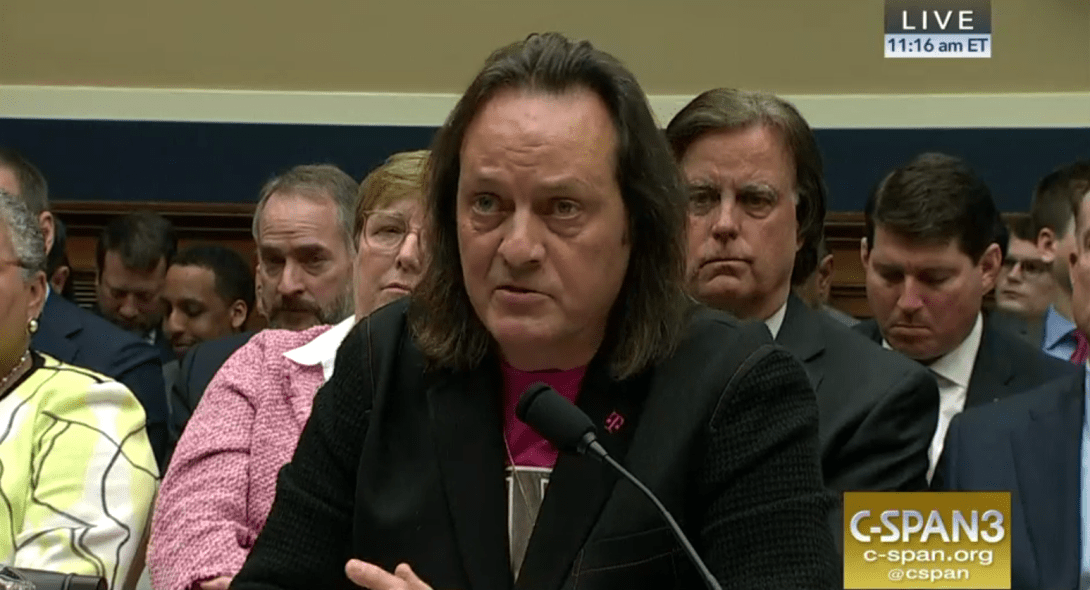The Tide Is Turning Against the T-Mobile/Sprint Deal

T-Mobile CEO John Legere testifies at a February House hearing.
Stocks are tumbling. Congress is asking questions. And the once seemingly forgone approval of T-Mobile’s $26-billion merger with Sprint is now in serious jeopardy.
Just last week — in response to reports that Justice Department regulators are highly skeptical of claims that Sprint needs the deal to survive — telecom stocks plummeted. And weeks ago, DoJ officials reportedly referred to “New” T-Mobile’s merger promises as “weak.”
Then on Thursday, news broke that more than a dozen state attorneys general are considering a lawsuit to block the deal on antitrust grounds.
The tide is finally turning against a merger that was a terrible idea from the get-go. But what’s bad news for T-Mobile shareholders is good news for its customers, many of whom are from low-income families and communities of color. Millions of these subscribers would be unable to afford basic internet access if this deal goes through.
Congressional scrutiny
Earlier this month, nine different U.S. senators sent an 18-page letter to FCC Chairman Ajit Pai and the DoJ urging them to reject the merger. Lawmakers cite the deal as “likely to raise prices for consumers, harm workers, stifle competition, exacerbate the digital divide, and undermine innovation.”
Among the group are four declared presidential candidates: Cory Booker, Amy Klobuchar, Bernie Sanders and Elizabeth Warren. In response to T-Mobile’s steady drumbeat of pro-deal talking points, the senators said they “… remain unconvinced that the merger would speed up the deployment of next generation 5G networks or extend affordable coverage to all Americans.”
Meanwhile, hearings were held in both the House Judiciary and Energy and Commerce committees, and T-Mobile CEO John Legere — a brash personality known for wearing the company’s signature magenta from head to toe — faced a tough round of questioning from Rep. Pramila Jayapal.
Rep. Rashida Tlaib is making the rounds with a scathing letter that opposes the deal as designed to help “a handful of individuals get significantly wealthier.” So far 36 lawmakers have signed on.
Trump Hotel investigation
The deal was announced on April 29, 2018. According to the Washington Post, “The next day, in Washington, staffers at the Trump International Hotel were handed a list of incoming ‘VIP Arrivals.’ That day’s list included nine of T-Mobile’s top executives — including its chief operating officer, chief technology officer, chief strategy officer and chief financial officer, and its outspoken celebrity chief executive, John Legere.”
In January, Post reporters broke the damning story on T-Mobile executives’ bookings, prompting Sen. Warren and Rep. Jayapal to issue letters addressed to the Trump Organization and T-Mobile demanding further explanation.
Upon further investigation, Post reporters found that T-Mobile executives have now booked more than 52 nights at Trump’s D.C. hotel since announcing their merger bid — spending a whopping $195,000 total on the president’s eponymous chain.
No California dreaming
Regulators in the nation’s largest state are fielding impassioned opposition to the deal, including a strong recommendation against the merger from the California Public Advocates Office.
Before a California Public Utilities Commission public hearing in January, representatives for the advocates office said the proposed transaction should be blocked “because of the irreparable damage to competition in the wireless market and the low-income customer markets as well as the absence of specific, measurable and verifiable benefits attributable to the merger.”
The hearing also saw a large turnout of local activists concerned about the deal’s potential impact on communities of color and low-income households struggling to afford wireless service. Testimonies against the merger were filed by community groups, national groups, California-based organizations and unions including the Communications Workers of America (CWA), the L.A. Federation of Labor and the Writers Guild of America.
And just this week, an administrative-law judge issued a ruling compelling T-Mobile and Sprint to respond to the advocates office’s substantive data requests, pushing the briefing schedule back accordingly.
New T-Mobile giving workers the ax
In its extensive public-relations campaign, T-Mobile representatives have failed to mention that the merger would lead to approximately 28,000 job losses nationwide, including more than 3,000 in California alone.
“As currently structured, the proposed T-Mobile and Sprint merger is against the public interest,” CWA President Chris Shelton said in a statement. “The merger would result in massive job losses totaling more than 28,000, while offering no countervailing benefits for the public.”
T-Mobile and Sprint are known for their more affordable prepaid brands, whose stores are located primarily in low-income communities of color — meaning that these job losses could hit those areas the hardest.
Recent history has shown that telecoms almost never keep their pre-merger promises regarding jobs, prices and just about any other consumer consideration. Just ask AT&T and Time Warner.
Widening the digital divide
It’s not just jobs on the line: It’s basic access to the internet, an indispensable tool for millions of people seeking employment, education, health care and participation in everyday life. Public advocates say this deal would exacerbate the digital divide by increasing the number of households of color without reliable access.
Free Press’ 2016 report Digital Denied showed that households of color were more likely to depend on wireless devices for their sole internet connection. Why? Home broadband has become largely unaffordable because behemoths like Comcast and CenturyLink have no incentive to offer affordable options.
Now T-Mobile wants to similarly consolidate wireless companies by eliminating its chief competitor.
There’s no amount of magenta that can paint any of this as a positive outcome.